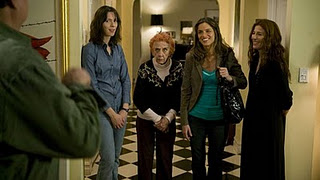Weekend Movies: Scott Pilgrim vs. The World and Please Give
By Raj Ranade
Are you ready to rumble (in a manufactured marketing-ploy kind of way)? Studio wonks have been spinning this weekend’s release of chick flick Eat Pray Love and 80s-action-hero-reunion The Expendables into an epic battle of the sexes faster than you can say “limp attempt to conjure publicity out of nothingness”. The pinnacle of tact in the phony back-and-forth is an unofficial Expendables YouTube trailer (unofficially co-opted by the actual campaign) which intercuts brawny Expendable action with shots from Twilight and Sex and the City and asks males to help the film beat Eat at the box office. “Take back what’s ours,” exhorts the trailer, claiming cinema for “us,” presumably along with other manly things like cars and voting rights. Of course, lost in the shuffle is the general critical drubbing of both films.
Fortunately, there’s a far more interesting battle being waged at the multiplexes this weekend. In one corner we have Edgar Wright (Hot Fuzz, Shaun of the Dead), the wunderkind comedic director who has crafted perhaps his finest technical achievement in his new Scott Pilgrim vs. The World. In the other corner stands Michael Cera, playing the title role of Pilgrim with the same limited range and anti-charisma that have marked every performance in his career. Can Wright somehow make an interesting film with the world’s dullest (yet still somehow bankable) leading man?
Remarkably, the answer is yes, and Wright’s triumph over the issues of his actor and his source material (a graphic novel series by Bryan O’Malley) is in its own way as remarkable as any of Scott Pilgrim’s battle victories over super-powered evil ex-boyfriends. The exes belong to Ramona Flowers (Mary Elizabeth Winstead), and our not-terribly-heroic man-child must defeat them all in video-game-styled duels to the death before he can win her heart, all while competing for a record deal in a Battle of the Bands and trying to find some direction for his aimless slacker life. Feel free to assemble your own critique of this basic plot by skimming through old reviews of Judd Apatow movies – possible choices include “a continual dull emphasis on immature man-children”; “marginalized female characters as solely male fantasies”; and “the fact that said females invariably end up with said lowly males.”
But Wright’s formal tricks extend far beyond the Apatow trope of continual male nudity. Pilgrim has the same kind of ground-breaking aesthetic kick found in films like Robert Rodriguez’s Sin City, but it also has the wit and intelligence to back up that approach. The fusing of reality and pop culture in the world of Pilgrim – the screen is continually flooded with comic-book onomatopoeia, video-game indicators, and anime-style visual distortion and split-screening – has a point. Wright’s film shows the way that a media-saturated generation views the world – as almost inextricable from the technology that permeates it.
The approach also allows him to be tremendously funny – few modern comedic directors know how to use editing and visual sleight-of-hand to set up punch lines quite like Wright, and the breakneck shot rhythms he establishes keep the film vibrating with comic delights in every corner of the screen. Wright also happens to be a tremendously talented director of action – the fight scenes here are more dizzyingly surreal and dreamlike than anything in Inception. If Wright had an actor as talented as his Hot Fuzz and Shaun of the Dead lead Simon Pegg in this role, the film might have been a comic masterpiece. As it is, some critics are simultaneously lauding the film’s technical prowess but declaring it a hollow pleasure due to that dull core plot. I’m inclined to think that eye-popping aesthetics and riotous humor alone are enough to make a film immensely satisfying.
But lest you think the men(-children) have won this weekend’s battle, be advised that Nicole Holofcener’s female-centric comedy Please Give, opening at the Kentucky Theatre, is just as good a film, if not better. Directing a satire of New York yuppies may initially sound like shooting caviar in a barrel. But Holofcener has plenty of new insights to bring to the story of Kate (Catherine Keener), a wealthy boutique owner paralyzed by guilt over her success and obsessed with extending charity to others.
For all her external nobility, Kate’s philanthropy has more to do with her attempts to improve her self-image, and Holofcener (Lovely and Amazing; Walking and Talking; Friends with Money) has great fun building an ensemble of similarly self-obsessed characters to skewer: Kate’s cheating husband (Oliver Platt), her acne-plagued daughter who lusts for $200 jeans (Sarah Steele), a mouthy spray-tanning spa worker (Amanda Peet), and a viciously cantankerous old lady (Ann Guilbert).
Give is a modest movie, one that eschews overt drama in favor of developing piercing insights and reveling in the resulting humor. But its achievements linger with you long after the film is over. In this day and age, many people will likely have trouble sympathizing with an issue as out of step with the times as the attempts of the wealthy to get over their guilt. But Holofcener’s remarkable achievement is that she can make even the most resistant audiences understand her character’s problems – and, if nothing else, she’ll have them laughing at those problems too.








